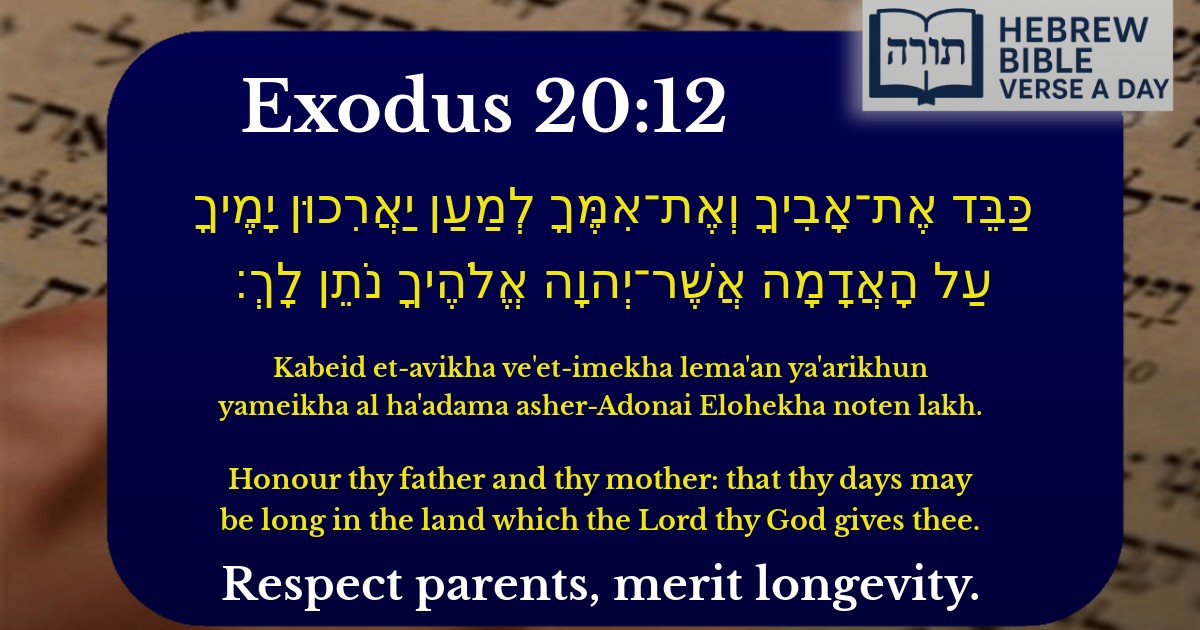Join Our Newsletter To Be Informed When New Videos Are Posted
Join the thousands of fellow Studends who rely on our videos to learn how to read the bible in Hebrew for free!
Hebrew Text
כַּבֵּד אֶת־אָבִיךָ וְאֶת־אִמֶּךָ לְמַעַן יַאֲרִכוּן יָמֶיךָ עַל הָאֲדָמָה אֲשֶׁר־יְהוָה אֱלֹהֶיךָ נֹתֵן לָךְ׃
English Translation
Honour thy father and thy mother: that thy days may be long in the land which the Lord thy God gives thee.
Transliteration
Kabeid et-avikha ve'et-imekha lema'an ya'arikhun yameikha al ha'adama asher-Adonai Elohekha noten lakh.
Hebrew Leining Text
כַּבֵּ֥ד אֶת־אָבִ֖יךָ וְאֶת־אִמֶּ֑ךָ לְמַ֙עַן֙ יַאֲרִכ֣וּן יָמֶ֔יךָ עַ֚ל הָאֲדָמָ֔ה אֲשֶׁר־יְהֹוָ֥ה אֱלֹהֶ֖יךָ נֹתֵ֥ן לָֽךְ׃ <span class="mam-spi-samekh">{ס}</span>
כַּבֵּ֥ד אֶת־אָבִ֖יךָ וְאֶת־אִמֶּ֑ךָ לְמַ֙עַן֙ יַאֲרִכ֣וּן יָמֶ֔יךָ עַ֚ל הָאֲדָמָ֔ה אֲשֶׁר־יְהֹוָ֥ה אֱלֹהֶ֖יךָ נֹתֵ֥ן לָֽךְ׃ {ס}
🎵 Listen to leining
Parasha Commentary
📚 Talmud Citations
This verse is quoted in the Talmud.
📖 Kiddushin 30b
The verse is discussed in the context of the importance of honoring one's parents, with the sages exploring the extent and nature of this commandment.
📖 Yevamot 6a
The verse is referenced in a discussion about the rewards for fulfilling commandments, particularly the promise of long life for honoring parents.
📖 Peah 1:1
The verse is mentioned in the Mishnah as one of the commandments for which no specific measure is prescribed, indicating its importance.


The Commandment to Honor Parents
The verse "כַּבֵּד אֶת־אָבִיךָ וְאֶת־אִמֶּךָ" ("Honor thy father and thy mother") is the fifth of the Ten Commandments and represents a fundamental principle in Torah. According to Rashi (Shemos 20:12), honoring parents is equated with honoring Hashem, as parents partner with Him in bringing a child into the world. The Mechilta further explains that this mitzvah is placed on the first tablet alongside commandments between man and G-d, emphasizing its divine significance.
The Nature of Honor
The Rambam (Hilchos Mamrim 6:3) details practical ways to fulfill this mitzvah, including:
The Sefer HaChinuch (Mitzvah 33) adds that honoring parents cultivates gratitude, a foundational trait for serving Hashem.
The Promise of Long Life
The verse concludes with "לְמַעַן יַאֲרִכוּן יָמֶיךָ" ("that thy days may be long"). The Talmud (Kiddushin 39b) explains that this refers to both Olam HaZeh (this world) and Olam HaBa (the World to Come). Rashi notes that the longevity is specifically tied to dwelling in Eretz Yisrael ("עַל הָאֲדָמָה"), teaching that honoring parents maintains the Jewish people's merit to dwell in the Land.
Parental Honor and National Stability
The Midrash Tanchuma (Eikev 2) connects this mitzvah to the endurance of society, stating that when children honor parents, families remain strong, ensuring the stability of the nation in its land. The Sforno emphasizes that honoring parents preserves the transmission of Torah values across generations, which is essential for maintaining our bond with Eretz Yisrael.
Limitations of the Mitzvah
The Gemara (Yevamos 6a) clarifies that honoring parents does not override Torah law. If a parent commands a child to transgress a mitzvah, the child must disregard the request, as "אֵין כְּבוֹדוֹ אֶלָּא כְּבוֹד הַמָּקוֹם" ("the honor due to parents is secondary to the honor due to Hashem"). This principle is codified by the Rambam (Hilchos Mamrim 6:12).